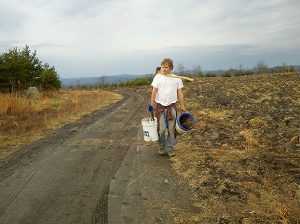Nathan Hall: Reclaiming Appalachia’s Land and Future
By Rachel Ellen Simon
Nathan Hall was born in the mountains of eastern Kentucky, surrounded by lush hardwood forests, cool trout streams and barren moonscapes — the latter courtesy of mountaintop removal coal mining. “It was all around me, in every direction from the house where I grew up within a mile or two,” he says. A former underground miner and native son of the region, Hall is now passionate about developing solutions to repair damaged lands and create a more sustainable future for the Appalachian coalfields.

Nathan Hall works to restore mined land near Fishtrap Lake in Pike County, Ky. Photo by Meredith Brown
A ninth generation Appalachian from Floyd County, Ky., Hall grew up hearing “if you want to do anything in life, you got to get out of here.” So after high school, Hall lit out for the flatlands of central Kentucky. In Louisville, he became aware of a growing movement to protest mountaintop removal mining, which back in eastern Kentucky “was never really framed as this huge issue that needed to be dealt with,” Hall says. He noticed that most of the activists he met in Louisville “had come from really far away to do all these radical actions,” he says, adding, “That made me really want to move back home and start working on local development issues.”
Returning to the mountains, Hall took several jobs in the coal mines, working as a belt shoveler and building brattice walls to control ventilation underground. Family members’ concerns for his safety, however, compelled Hall to leave the mines after six months and head back to school.
At Berea College, Hall designed his own bachelor’s degree in sustainable agricultural and industrial management. While in school, he founded East Kentucky Biodiesel, LLC, the region’s first producer of biodiesel from waste vegetable oil. In 2009, Hall won a $30,000 Kentucky New Energy Ventures grant to support the construction of a portable biodiesel system that could double as a traveling educational tool.
Shortly after graduating magna cum laude in 2009, Hall embarked on a year of international travel, funded by the prestigious Thomas J. Watson Foundation. He traveled to nine countries to explore how other mining-impacted areas have dealt with their issues, and how Appalachia might do the same.
“I initially set off assuming that I would find all these awesome examples of ways we could transition,” Hall says. “But the places where renewable energy and remediation projects were happening were more urban areas, or coastal areas, whereas in the actual mining towns not much had changed.”
Confident that rural Appalachia might do it better, Hall returned to the United States in January 2012. Soon after, he was hired as reforestation coordinator for Green Forests Work, a Lexington, Ky.-based nonprofit dedicated to reforesting surface mined land in Appalachia that has planted over one million native hardwood trees since its founding in 2010.
Next, Hall has plans to pursue a sustainability-focused MBA, with the ultimate goal of founding a Benefit Corporation — a business model that emphasizes social and environmental responsibility over profit — in order to realize his multi-faceted plan for reutilizing surface mined lands across Central Appalachia.
“My goal is to help start on-the-ground projects in the coalfields that work from an environmental and economic standpoint, and hopefully employ as many people as possible,” Hall says. His business model will connect renewable energy development, commercial crop production and remediation of damaged lands “in ways that are synergistic and can accomplish more than one goal at once.” The East Kentucky Biodiesel project will be critical in this venture, as locally collected cooking oil and oilseed crops grown on the mined lands will then fuel the diesel equipment used to further work the land.
Emphasizing the need to move the region beyond what he calls the “coal miners versus tree-huggers mentality,” Hall aims to employ former surface miners in future remediation projects, enabling them to “retool their existing skill set” in a changing economic landscape.
“We need to talk about the positive things, and the good ways to move forward, while we still respect people’s pasts, and respect their hard work – even if it might have been on a strip mine,” Hall says.
Hall’s perception of his home region has changed greatly over the years. Growing up in a place where mountaintop removal was “just a part of the landscape,” he once thought of eastern Kentucky as little more than “something to get away from.” Yet, where he once saw value nowhere, Hall now sees value everywhere — in the land, in the people, and in the infinite possibilities of both.
Related Articles
Latest News
More Stories

Leave a comment
Your email address will not be published. Required fields are marked *
2 responses to “Nathan Hall: Reclaiming Appalachia’s Land and Future”
-
What can I do when coal mines has destroyed my home and lawyers in the area have all been bought off
-
May God bless your work and your life.






Leave a Comment